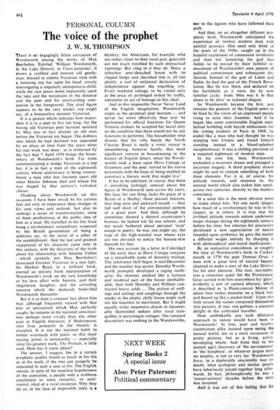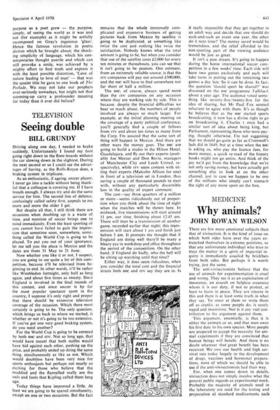PERSONAL COLUMN
The voice of the prophet
J. W. M. THOMPSON
There is an engagingly feline caricature of Wordsworth among the works of Max Beerbohm. Entitled 'William Wordsworth, in the Lake District, at Cross-purposes', it shows a crabbed and morose old gentle-, man, dressed in solemn Victorian state with a towering top hat upon his head, crossly interrogating a singularly unresponsive child; while the rain pours down impartially upon the lake and the mountains in the distance and the poet and his unrewarding com- panion in the foreground. The chief figure appears to be the very model, one might say, of a humourless eminent Victorian.
It is a picture which indicates how impru- dent it is in a poet to live too long; for the boring old Victorian poet laureate satirised by Max was in fact already an old man before the Victorian era began. The dullness into which he had declined was separated by an abyss of time from the years when his real work was done: as is witnessed by the fact that 7 April 1970 brings the bicen- tenary of Wordsworth's birth. Far from commemorating a stodgy Victorian in a top hat, it is in fact a man of the eighteenth century whose anniversary is being remem- bered, a man who was fourteen years old when Doctor Johnson died and whose life was shaped by that century's turbulent climax.
Thinking about Wordsworth on this occasion, I have been struck by his curious fate not only to experience deep changes in his own views and outlook, but also to undergo a series of transformations, some of them posthumous, in the public idea of him as a man. He travelled in his life from being a revolutionary sympathiser, suspected by the British government of being a seditious spy, to the status of a pillar of the establishment. And the last and greatest reappraisal of his character came only in this century, with the discovery of the truth about his relationship with Annette Vallon —which certainly put Max Beerbohm's dessicated Eminent Victorian in a new light. Sir Herbert Read, in a brilliant book, erected an entirely fresh interpretation of Wordsworth's work on the new knowledge of his love affair with Annette, and their illegitimate daughter, and the corroding remorse which (he deduced) bedevilled Wordsworth thereafter.
But it is at least a constant fact about him that, although frequently viewed with that hint of amusement which Max perfectly caught, he remains in the national conscious- ness perhaps more vividly than any other poet in English literature, if Shakespeare, who lives primarily in the theatre, is excepted. It is not the national habit to bother overmuch with poets, so this sheer staying power is noteworthy — especially since his greatest work, The Prelude, is little read. How has it come about?
The answer, I suggest, lies in a certain prophetic quality found as much in his life as in his work, if the two can properly be separated in such a case as his. The English remain, in spite of the manifest hopelessness of the aspiration, a people with a stubborn attachment to some romantic, or senti- mental, ideal of a rural existence. Why they do so, in the face of impossible odds, is a mystery; the Americans, for example, who are rather closer to their rural past, generally are not much troubled by such impractical yearnings. But cling to it they do. Many a suburban semi-detached house with its clipped hedge and cherished tree is, all too plainly, a sort of unilateral declaration of independence against the engulfing city.
Every weekend cottage, to be visited only at the price of prolonged ordeal by traffic, represents an act of homage to this ideal.
And in this impossible Never Never Land of the English imagination, Wordsworth
reigns as the perpetual poet laureate — and serves far more effectively than ever he performed his official functions for Queen Victoria (indeed, he accepted her laurel only on the condition that there would not be any functions to perform). The householder who dreams that his villa beside the North Circular Road is really a rustic retreat is remembering, however faintly, that most significant venture in housekeeping in the history of English letters, when the Words- worths took a lease upon Dove Cottage at Grasmere and the poet 'retired to his native mountains with the hope of being enabled to construct a literary work that might live.'
It has to be admitted, of course, that there is something lurkingly comical about the figure of Wordsworth seen across the years. His face, for one thing, lacks the grace of a Byron or a Shelley; those peasant features, that long nose and awkward mouth — they fall well short of the conventional pattern of a great poet. And then, although he sometimes showed a shrewd countryman's humour, he lacked wit; he was solemn, and not much bothered about personal 'style' except in poetry; he was, one might say, the type of the high-minded man whose eyes are too elevated to notice the banana-skin beneath his feet.
His own account (in a letter to Coleridge) of the early days at Dove Cottage conjures up a remarkable scene of domestic mishap. The celebrated idyll began in mid-December and the weather was severe. Dorothy Words- worth promptly developed a raging tooth- ache; the chimney smoked like a furnace and rendered part of the house uninhabit- able; then both Dorothy and William con- tracted heavy colds ... The picture of sniff- ings and achings and coughings through the smoke in the empty, chilly house might well stir the heartless to merriment. But it might equally strike responsive chords in innumer- able likeminded seekers after rural tran- quillity in picturesque cottages. The rampant discomfort was nothing to the Wordsworths,
nor to the legions who have followed their path.
And then, on an altogether different pro- phetic level, Wordsworth anticipated the
experience of restless modern man with painful accuracy. One need only think of the poets of the 1930s, caught up in the hopeful excitement of communist revolution and then left lamenting the god that failed, to be moved by their faithful re- enactment of Wordsworth's own pattern of political commitment and subsequent dis- illusion. Instead of the god of Lenin and Stalin, he had the god of the French Revo- lution. But he was there, and endured on the battlefield, as it were, the by now familiar cycle: from 'bliss was it in that dawn to be alive' to sickened disgust.
So Wordsworth became the first, and remains the greatest, of the English poets to be fired by the. vision of an oppressed people rising to seize their freedom. And if he began like some comfortable English intel- lectual bubbling with boyish enthusiasm for the rioting students of Paris in 1968, he ended like a man who had thought he was stepping into Utopia and found himself standing instead in a blood-splashed slaughterhouse. It was a chilling prevision of a repeated nightmare of modern man.
In his own life, then, Wordsworth embodied a recurrent dream and presaged a recurrent tragedy. A third prophetic strand might be said to contain something of both these elements. For it is, of course, his attitude towards, and response to, the natural world which also makes him speak, across two centuries, directly to the modern conscience.
In a sense this is the most obvious point to make about him. Yet one easily forgets how much of a revolutionary he was in this respect, as in others. It is true that the civilised attitude towards nature underwent major changes during the eighteenth century before his time; but whereas his precursors developed a new appreciation of nature founded upon aesthetics, he gave the matter a different weight entirely by charging it with philosophical and moral implications.
By an instructive coincidence, at roughly the time of Wordsworth's birth in Cocker- mouth in 1770 the poet Thomas Gray, a man with a great love of natural beauty, chanced to make a tour of the Lake District for his own pleasure. The tour, inevitably, was a conscious quest for the Picturesque. Gray carried with him everywhere his 'glass', evidently a sort of camera obscura, which is described as 'a Plano-convex Mirror of about four inches diameter on a black foil. and bound up like a pocket-book'. Upon this little screen the scenes composed themselves into pictures. It was, one gathers, a constant delight to the cultivated traveller.
How unthinkable any such dilettante approach to nature would have been in Wordsworth! In him, poet and healthy countryman alike insisted upon seeing the natural world, not as a mere succession of pretty pictures, but as a living, active,
enveloping whole. And from that to the present age's discovery of 'the environment' or 'the biosphere', or whatever jargon term we employ, is not so very far. Wordsworth
knew, in a deplorably unscientific way no doubt, what ecologists and similar people
have laboriously pieced together long after- wards. In fact, philosophically he was a 'conservationist' decades before the term was invented.
And it was out of this feeling that his
purpose as a poet grew — the purpose. simply, of seeing the world as it was and not (for example) as it might be artfully recomposed on Gray's ingenious 'glass'. Hence the famous revolution in poetic diction which he brought about; the shock- ing simplicity of language, which his con- temporaries thought puerile and which can still provoke a smile, was achieved by a mighty effort to find truth and express it with the least possible distortion, 'Love of nature leading to love of man' — that was the quaint title he gave to one book of The Prelude. We may not take our prophets over-seriously nowadays, but might not that summing-up carry a profounder meaning for today than it ever did before?



































 Previous page
Previous page